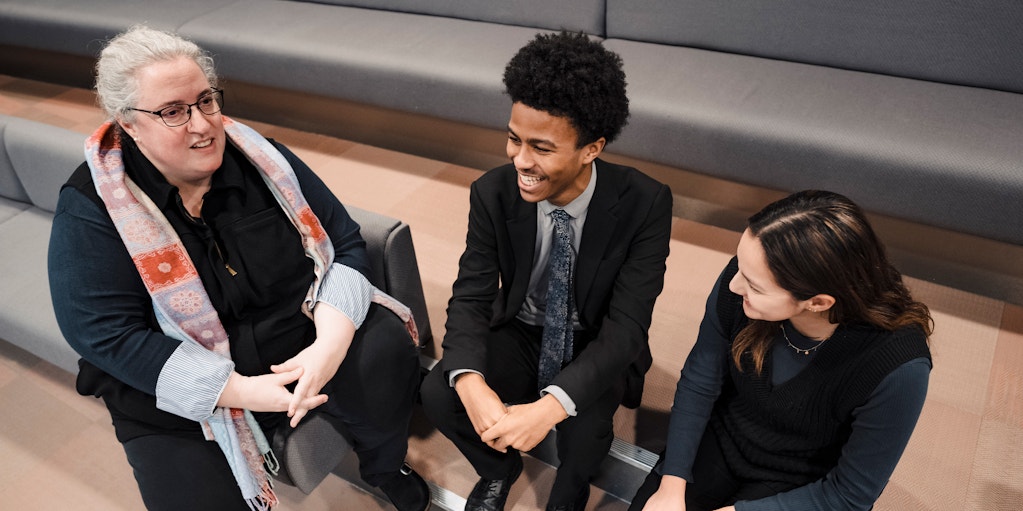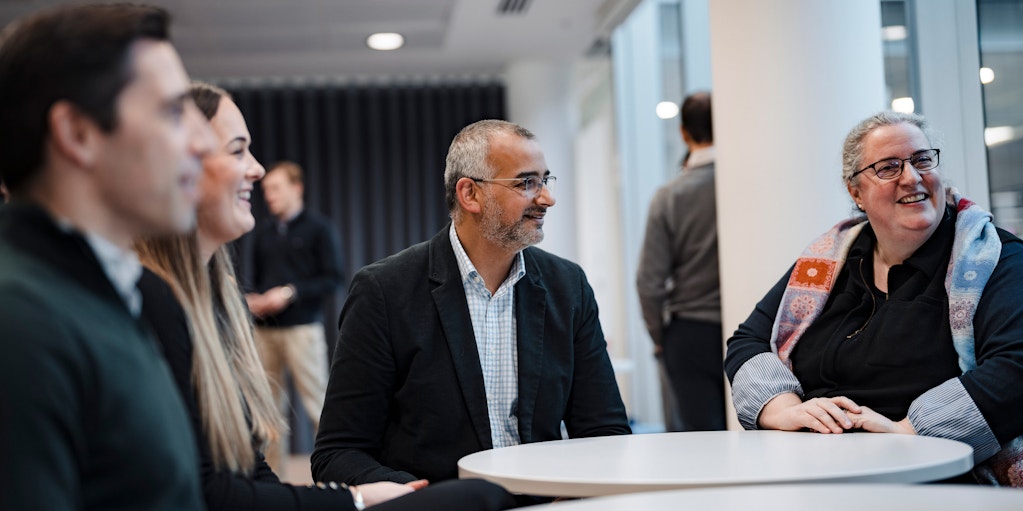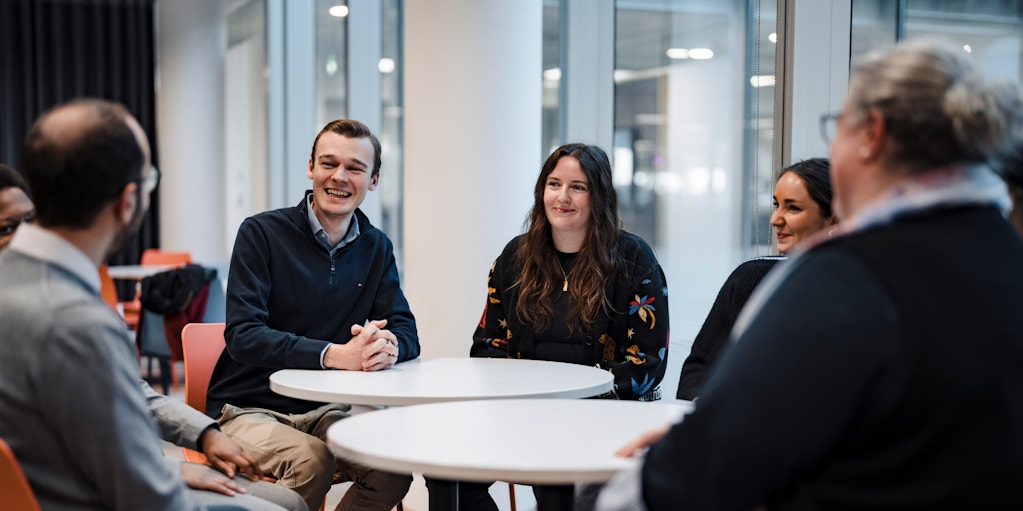
15 minutes with: Sara Ulrich
Tags
Our experts are on the frontlines of bringing ingenuity to life for our clients. They accelerate new growth ideas from concept, through design and development to commercial success. And they revitalise organisations with the leadership, culture, systems and processes to make innovation a reality.
In this series, you’ll meet some of the brilliant minds creating change every day.

What is your background and how did you come to PA?
I’ve had three work lives. I used to be an academic, teaching and training students, diplomats, and military personnel in international defence and security relations. Being a bit geeky, I started to develop my own human interactions-based simulations.
The second part of my work life was at a startup from King’s College London called Simulstrat. It was the first social science spin-off company to use military wargaming to create a business wargaming methodology that could be applied to strategy, policy, readiness, and resilience.
I then joined a management consultancy, developing client solutions around crisis management, resilience simulation exercises, major projects, and strategy wargaming, including strategic risks readiness, especially around preparing for Brexit.
I then got a call from Johnny Gilbert, who at the time was PA’s complex systems capability lead, who asked if I wanted to combine my social science knowledge of decision support methods and techniques with PA’s in-house systems thinking engineering capabilities. As he mentioned the words ‘systems thinking’, my life changed.
Systems thinking is an approach to problem solving which takes into account the overall system as well as its individual parts. I was excited to create the first decision support practice of its kind, combining wargaming with systems thinking to help clients make sense of this complex ecosystem we live in.
I’ve been at PA for over three years now and never looked back. We have a fantastic team, continuously growing, to support our clients’ decision-making and planning. We have developed a strong practice across readiness and resilience spanning strategy, innovation, operating models, and major programmes.

How would you explain what you do to someone who had never heard of your role before?
I lead a team that helps organisations and their leaders make more informed and confident decisions, and get clarity on their journey in this particularly complex and uncertain world through wargaming.
Wargaming is a scenario-based immersive method that creates a ‘safe place to fail’ where you can try out certain options, actions, and decisions to see what works and what does not. For different reasons, decisions are often biased, and we only see what we want to see. Very often, leadership teams work in siloes.
So, it is really important that we help leaders to see ‘the forest and the trees’, zooming in to see what a team does, for example, then zooming out to look at the whole ecosystem, interdependencies, and blind spots.”
This is very helpful for organisations, because they receive practical recommendations based on identified gaps and unforeseen opportunities, accelerate alignment, and feel more confident that they will make the right choices.
What’s different about working with PA?
What attracted me to PA, and what makes PA very different, is the people. The flat culture is one of the main reasons I joined. There’s a sense of community where you empower team members, gather their views, and help them grow. That’s been very exciting for me as a leader at PA. The other reason I joined is that there is a winning combination of the product-making side, designers, engineers, and scientists, with core advisory to support readiness and resilience. That is where the magic happens.
How has your work changed in recent years?
My work constantly evolves as the world changes, but the crucial aspect is getting the right balance between human interactions and digital technology tools that accelerate decision-making – such as AI, modelling, quantum, and digital twins. Technology can help the decision-making process, streamline the consideration of options, and add another layer of deep insight. Wargaming is really about making sense of complex environments, and we have never seen a world that is so volatile and uncertain, with all these compounded risks and perfect storm scenarios. Brexit, COVID-19, economic shifts, you name it, all happening at the same time. This makes it very tricky for organisations to make big decisions, and it’s why wargaming is so valuable.

What’s the role of ingenuity in the work that you do?
Wargaming is ingenuity in action – literally. It’s about bringing relevant and different tools together to help accelerate meaningful decision-making. Wargaming is the ‘crown jewel’ as clients take decisions or actions. The great thing is that they are ‘doing’, rather than having a death by PowerPoint experience. It’s a method that has always proven invaluable in the military, and in the last 10 years has seen a huge boom in the business world.
The ingenious part of wargaming is how it combines decision-making support from a behavioural human interaction perspective with the exciting tools at our disposal from a digital and tech perspective.”
Ingenuity is when you get it just right, and have those ‘aha’ moments – when suddenly leaders see a new path forward, and tell you that you helped them streamline internal alignment by three years, or achieved significant cost savings by de-risking their plans.
What makes PA’s wargaming different?
Firstly, we are the only consultancy that combines military wargaming with business wargaming – we can support wargaming for the defence and security sector, as well as do business strategy war games because we have a team that combines those skills. Secondly, we’re the only dedicated end-to-end decision support practice. We have a unique combination of product innovators, system thinkers, engineers, deep industry experts, and strategic advisors. It’s that breadth that gives us a fantastic differentiator.
What’s really exciting you at the moment within your work?
In my line of work, and in a good, problem-solving way, the more complex the world, the more challenging the decision and planning support work becomes. How can we help organisations and their leaders, in this extremely uncertain world with compounded risks and perfect storm scenarios, make more confident decisions? Those decisions are always driven by human behaviours. So, how can you supplement human interactions with technology such as AI and data, such as forecasting models, to support lasting behavioural change and break siloes to accelerate alignment? That’s my biggest current challenge – bringing the right decision-making supporting tools to accelerate behavioural change.
What project are you most proud of?
At PA, our partnership with National Highways is a stand-out example. As part of National Highways’ Digital Services, we helped establish a new level of digital resilience capability that reduces disruption and protects the roads ecosystem. Sometimes, you just click with a client and that’s exactly what happened here.
We co-created a very bespoke, digital resilience improvement programme that brought together the different skills and capabilities of PA – including wargaming, but also systems thinking, cyber security, resilience, transformation, and change management.”
We’re now going into the third year of the project. It’s really fantastic to see the progress from the beginning of drafting the approach to implementation, and preparing to transition to business as usual. It’s a fascinating project to be part of and to lead.
Another example is our work with a global manufacturing client to support their strategy readiness. We worked with colleagues who had deep innovation, technology, and AI knowledge to analyse the landscape, look at immediate, medium, and longer-term trends, and dive into the competitors to their products in a particular market.
We combined this deep market analysis with strategy wargaming, bringing this analysis to life by playing out two war games: one in the shoes of their competitors, and one as themselves. The knowledge gained from the role reversal really enhanced their competitive strategy readiness and accelerated consensus building on where to focus, and to develop a more robust, competitive strategy.

What are your key goals for the future?
I always said that I would like to be the leader I wished I had. At PA, the people, flat structure, and the culture have given me an opportunity to develop this leadership model.
It’s all about empowering people at all levels and making sure they are able to grow in a consulting world, which is interesting though often challenging. The question I ask myself is how I can be an authentic catalyst to help people become good decision support consultants, and help them grow so they can lead the way for the next generation.
What advice would you give to someone who wanted to follow in your footsteps?
There’s no one path to consulting. My three work lives are proof of that. I never thought I would be a wargaming lead, but you never know where your path will take you.
Part of it is about understanding that your differences are your strengths and what makes you unique. For example, I’m half French and half German. Since I was very young, I moved home many times and I was also very lucky to travel around the world when I was in academia. I also met my husband, who is from Malaysia, and we settled in London.
So, I’m extremely internationally minded, which helps me to lead differently because I understand different cultures and different ways of thinking. It’s a humbling experience to see beyond yourself in a little corner of the world. This has been a thread through my life – international cultures and how to work with them, and you always continue to learn.
Another piece of advice is to always try something new. Try, fail, evolve. That’s how you become a better consultant and build that grit muscle.
My last tip is to find your work purpose. This obviously takes time, and you might not find it at 25 – so you have to be a bit patient. But when you can articulate why you get up in the morning and what excites you at work and build a team around you, that’s the best thing.
What are you looking forward to right now?
Work wise, I’m looking forward to going to the US very soon, where I’ll meet colleagues and potential collaboration partners. I’m really excited about the US and for us to do more work there to help with major programmes on readiness and resilience, as well as strategy readiness.
On a personal level, I am very excited to fulfil a childhood dream: to attend the Paris Olympic Games, and as a former volleyball player – a long time ago – to experience the indoor volleyball, and the beach volleyball under the Eiffel tower.
Explore more







